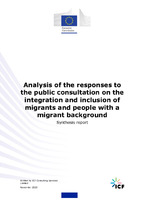| dc.contributor.author | Directorate-General for Migration and Home Affairs |
| dc.contributor.author | ICF Consulting Services Limited |
| dc.date.accessioned | 2022-05-26T09:07:03Z |
| dc.date.available | 2022-05-26T09:07:03Z |
| dc.date.issued | 2020-12-03 |
| dc.identifier.isbn | 978-92-76-25458-4 |
| dc.identifier.uri | https://ketlib.lib.unipi.gr/xmlui/handle/ket/3856 |
| dc.description | DOI 10.2837/110357 |
| dc.description | Catalogue number DR-03-20-781-EN-N |
| dc.description | LEGAL NOTICE This document has been prepared for the European Commission however it reflects the views only of the authors, and the Commission cannot be held responsible for any use which may be made of the information |
| dc.description | n person: All over the European Union there are hundreds of Europe Direct information centres. You can find the address of the centre nearest you at: https://europa.eu/european- union/contact_en On the phone or by email: Europe Direct is a service that answers your questions about the European Union. You can contact this service: by freephone: 00 800 6 7 8 9 10 11 (certain operators may charge for these calls) at the following standard number: +32 22999696, or by email via: https://europa.eu/european-union/contact_en |
| dc.description.abstract | The public consultation on the integration and social inclusion of migrants and people
with migrant background ran from 22nd July until 21st October 2020.
The objective of the public consultation was to collect the views on a number of key
aspects and identify priorities from a broad range of stakeholders. The consultation
was open to all interested stakeholders from the public and private sectors, including
national and local authorities, commercial and non-commercial organisations, experts,
academics as well as EU and non-EU citizens. The public consultation was
complementary to the targeted consultation meetings organised in parallel with
different stakeholders.
The results of the public consultation will feed into a new action plan on integration
and inclusion as announced in the 2020 European Commission’s Work Programme and
in the new Pact on asylum and integration.
The integration and social inclusion of migrants are crucial not only to ensure the
cohesion of our societies but also to address skills gaps, labour shortages, and to
boost economic performance overall. The EU's competences in the area of integration
are set out in the Treaty on the Functioning of the European Union. While the EU has
no competence to harmonise laws and regulations in Member States related to
integration, the EU may provide various incentives and support for Member States to
advance the integration of third-country nationals legally residing on their territory.
The Treaty on the Functioning of the European Union also sets out the EU's
competence to support and complement Member States’ activities in combating social
exclusion and poverty.
The key documents setting out the scope for the EU action on integration of migrants
are the 2004 common basic principles for immigrant integration with its 11 principles,
including the respect for basic EU values, and the Commission's 2016 action plan on
the integration of third-country nationals. |
| dc.format.extent | 13p. |
| dc.language.iso | en |
| dc.publisher | Directorate-General for Migration and Home Affairs |
| dc.subject | Civil society |
| dc.subject | Cooperation policy |
| dc.subject | EU Member State |
| dc.subject | Governance |
| dc.subject | Immigration |
| dc.subject | Integration of migrants |
| dc.subject | Labour market |
| dc.subject | Private sector |
| dc.subject | Public consultation |
| dc.subject | Public sector |
| dc.subject | Report |
| dc.subject | Social partners |
| dc.title | Analysis of the responses to the public consultation on the integration and inclusion of migrants and people with a migrant background |
| dc.type | Synthesis report |
| dc.publisher.place | Luxembourg |

